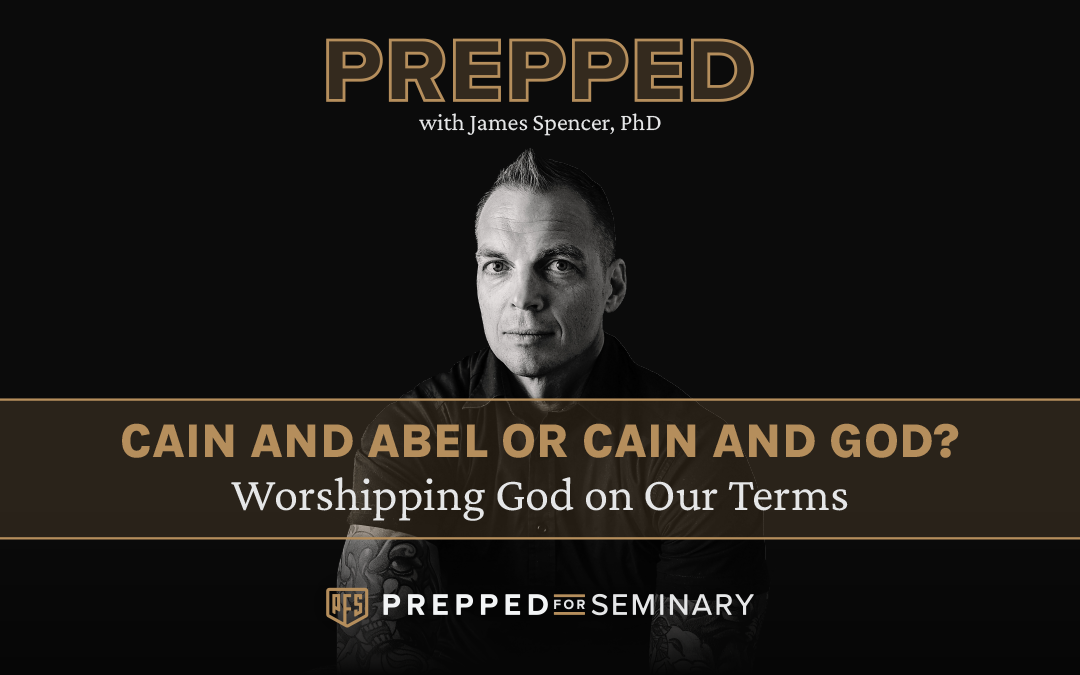https://podcast.preppedforseminary.com/cain-and-abel-or-cain-and-god-worshipping-god-on-our-terms/
What happens when we try to worship God on our own terms?
The story of Cain is often reduced to sibling rivalry, but Genesis 4 is far more than that. It is a sobering lesson about how sin festers when we refuse to submit to God’s authority—and the tragic consequences that follow.
Cain’s rebellion didn’t end with him; his legacy spiraled into a complete rejection of God’s ways. Lamech, a descendant of Cain, takes that rebellion to an extreme, boasting of his own violence and distorting God’s justice into a weapon of pride. Their stories serve as a stark warning: Sin left unchecked will not only persist—it will multiply.
Cain’s Offering: Worship on His Terms
Genesis 4 opens with Cain and Abel bringing offerings to God. Abel offers the firstborn of his flock—the best of what he has. Cain, on the other hand, brings “some” of his crops (Gen. 4:3-4). The difference is striking: Abel’s offering is intentional and honoring to God, while Cain’s is generic, an afterthought.
God rejects Cain’s offering, not because He dislikes grain sacrifices (they are later accepted in the Mosaic Law), but because Cain’s heart posture is wrong. Instead of bringing what God requires, Cain brings what he wants to bring.
When God corrects him, Cain has a choice: repent and realign his worship with God’s expectations or persist in his defiance. He chooses the latter.
Murder as an Attempt to Control God
Cain’s response to God’s rejection isn’t repentance—it’s rage. But here’s the deeper issue: Cain doesn’t just want to eliminate Abel. He wants to manipulate God.
If Abel is the only one offering acceptable worship, Cain assumes that removing him will force God to accept his worship. It’s as if he’s saying, “You’ll have no choice but to take what I give you.”
This is a tragic miscalculation. Cain forgets that God doesn’t need human worship. He is not bound by our terms. Rather than submitting, Cain tries to corner God into accepting his version of faithfulness.
But God’s response is clear: Cain is banished, sent away from His presence. Instead of being forced to accept Cain’s way, God removes Cain entirely.
Lamech: When Rebellion Becomes a Legacy
Cain’s rebellion doesn’t die with him. His descendant, Lamech, takes sin to a whole new level:
“I have killed a man for wounding me, a young man for striking me. If Cain’s revenge is sevenfold, then Lamech’s is seventy-sevenfold.” (Gen. 4:23-24)
Where Cain at least feared God’s judgment, Lamech mocks it. He twists God’s protection of Cain into an arrogant declaration of self-reliance. He boasts of his ability to take vengeance into his own hands, showing just how far humanity has fallen.
Lamech represents the unchecked expansion of Cain’s rebellion. When sin is left unaddressed, it doesn’t just continue—it grows.
A Glimmer of Hope: The Line of Seth
After Abel’s murder and Cain’s banishment, it seems as if true worship has disappeared. But then, Genesis 4:25 introduces Seth—a new beginning.
“At that time, people began to call on the name of the Lord.” (Gen. 4:26)
Where Cain’s lineage leads to Lamech’s arrogance, Seth’s lineage leads to Noah, Abraham, and, ultimately, Christ. God’s plan for redemption moves forward despite human failure.
Cain’s attempt to control God through false worship failed. Lamech’s arrogance didn’t erase God’s justice.
In the end, God’s purposes prevailed.
Reflection Questions
- Are you worshiping God on His terms or your own?
- Like Cain, are you offering what you want rather than what God has asked of you? How might God be calling you to surrender in worship?
- Where is sin growing unchecked in your life?
- Sin, when ignored, multiplies. Are there areas where compromise has taken root? How can you bring those before God today?
- Do you trust in God’s authority, or do you seek control?
- Cain thought he could manipulate God. Lamech rejected Him entirely. Where are you struggling to trust God’s plan instead of forcing your own way?
- How can the hope of Seth’s lineage encourage you today?
- Despite human failure, God’s redemptive plan never falters. How does this truth shape your faith in seasons of difficulty or doubt?
The story of Cain, Abel, Lamech, and Seth reminds us that we are always choosing one path or another—submission to God or self-rule. But God, in His mercy, continually provides a way back. Through Christ, we are invited to reject Cain’s legacy and walk in the faithfulness of Seth, calling on the name of the Lord.
Let’s be people who worship God as He desires—on His terms, not our own.
